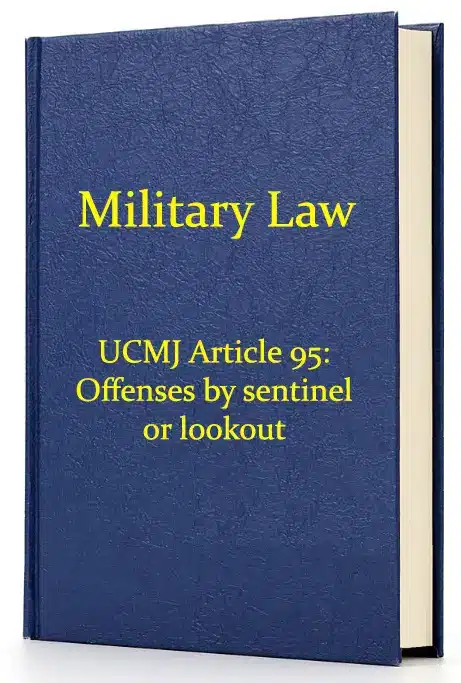The MCM states under Article 95 (Offenses by a sentinel or lookout) that any service member may be prosecuted if they are drunk or asleep on the post, leave their post before being relieved, or are found loitering or wrongfully sitting while on the post.
For a service member to be convicted of an Article 95 violation regarding being drunk on the post, asleep, or leaving their post before being relieved, the prosecution must demonstrate the accused:
-
was posted or on the post as a sentinel or lookout;
-
was drunk while on the post, sleeping while on the post, or left before being regularly relieved.
If the offense was committed during a time of war or when the accused was receiving special pay, the prosecution must also prove that the event occurred and that it was during a time of war or when the accused was receiving special pay.
To be prosecuted for loitering or wrongfully sitting on a post, it must be demonstrated the accused:
-
was posted as a sentinel or lookout and
-
the accused loitered or wrongfully sat down on the post while so posted.
If the offense occurred during a war or when the accused received special pay, the prosecution must also prove the accused was posted to the position.
Understanding Article 95 (Offenses by sentinel or lookout) of the UCMJ
The behaviors specified in Article 95, drunk on the post, asleep on the post, or leaving the post before being relieved, do not apply to those who are not assigned as a sentinel or lookout, nor does it apply to anyone whose duties do not require constant alertness and attentiveness.
“Post” is the area in which the service member is required to be for the performance of their assigned duties. Depending upon the responsibilities specified, the surrounding areas may be included as the lookout of the sentinel’s given post. For the offense of leaving the post to apply, the sentinel or lookout must have traveled a distance sufficient to hinder their ability to perform their assigned duty. The order to go “on post” must have been lawful, but it may or may not have been formally given.
Suppose the service member is accused of sleeping on post. In that case, they don’t need to have been entirely comatose, merely physically and mentally impaired enough not to be able to perform their duties. If, however, the accused suffered a physical incapacity due to a disease or accident that caused the sleeping, this would be considered an affirmative defense.
Loitering refers to standing around, moving slowly, lingering, or lagging when it directly violates instruction or allows the accused to fail to give complete attention to their assigned duties.
Maximum Possible Punishment for Violations of Article 95
Suppose one is convicted of being drunk, sleeping on the post, or leaving the post before being relieved. In that case, the maximum possible punishment is a dishonorable discharge, forfeiture of all pay and allowances, and confinement for one year. If the offense occurred while the accused received special pay, the maximum punishment includes a dishonorable discharge, forfeiture of all pay and allowances, and confinement for ten years. If the offense occurred during the war, the maximum possible punishment is death.
Suppose one is convicted of loitering or wrongfully sitting down on post by a sentinel or lookout. In that case, the maximum possible punishment is a bad-conduct discharge, forfeiture of all pay and allowances, and confinement for six months. Suppose the offense occurred during a war or while the accused received special pay. In that case, the maximum possible punishment is a dishonorable discharge, forfeiture of all pay and allowances, and confinement for two years.
How do you defend against Article 95 Offenses by Sentinel or Lookout charges?
When facing the combined resources of the military and the current cultural climate, you need to be prepared to defend your career and your freedom. Crisp and Associates, LLC has a team of experienced trial attorneys who have won these cases. This team includes the firm’s founder, Jonathan Crisp, a highly respected former Army JAG with over 23 years of experience in military law and a sought-after speaker and lecturer on martial law. Donald Gordon has litigated cases before the Discharge Review Board, the Board for Correction of Military Records, and the Board for Correction of Naval Records regarding various matters and a diverse background of clients.
If you or someone you know is facing Article 95 charges for Offenses by Sentinel or Lookout, you must immediately speak with a Military defense attorney.


